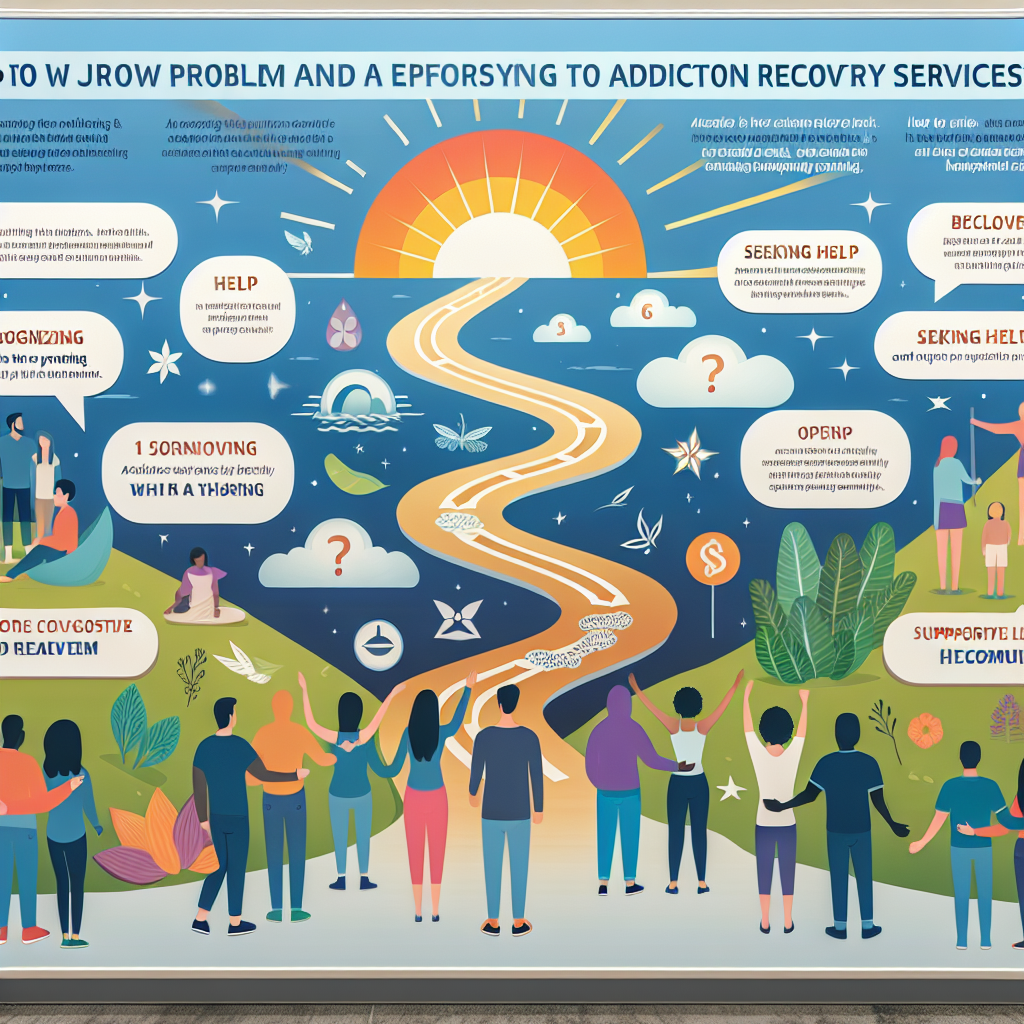-
Table of Contents

“Addiction recovery services: Guiding you to a healthier, substance-free life through support, treatment, and empowerment.”
Introduction
Addiction recovery services encompass a range of professional support systems designed to help individuals overcome substance use disorders and achieve long-term sobriety. These services include medical detoxification, inpatient and outpatient rehabilitation programs, counseling, therapy, support groups, and aftercare planning. By providing medical care, psychological support, and social resources, addiction recovery services aim to address the physical, emotional, and social aspects of addiction. They help individuals develop coping strategies, build a support network, and create a sustainable plan for maintaining sobriety, ultimately improving their overall quality of life and well-being.
Understanding Addiction Recovery Services: A Comprehensive Guide to Support and Resources
Addiction recovery services encompass a wide range of support systems and resources designed to help individuals overcome substance abuse and lead healthier, more fulfilling lives. These services are tailored to meet the unique needs of each person, recognizing that addiction is a complex and multifaceted issue. By understanding the various components of addiction recovery services, individuals can better navigate their journey towards sobriety and long-term recovery.
One of the foundational elements of addiction recovery services is detoxification, often referred to as detox. This process involves the safe and supervised withdrawal from addictive substances, allowing the body to rid itself of toxins. Detox is typically the first step in the recovery process and is crucial for managing withdrawal symptoms and preventing potential medical complications. Medical professionals provide support and care during this phase, ensuring that individuals are as comfortable as possible.
Following detox, many individuals transition into residential or inpatient treatment programs. These programs offer a structured environment where individuals can focus entirely on their recovery without the distractions and triggers of everyday life. Inpatient treatment typically includes a combination of individual therapy, group therapy, and educational sessions. These therapies aim to address the underlying causes of addiction, such as trauma, mental health issues, or environmental factors, and equip individuals with coping strategies to maintain sobriety.
For those who may not require the intensive support of inpatient treatment, outpatient programs provide a flexible alternative. Outpatient services allow individuals to continue with their daily responsibilities, such as work or school, while attending therapy sessions and support groups. This approach can be particularly beneficial for those with strong support systems at home or those who have already completed an inpatient program and are transitioning back into their regular routines.
In addition to these formal treatment options, peer support groups play a vital role in addiction recovery. Organizations such as Alcoholics Anonymous (AA) and Narcotics Anonymous (NA) offer a sense of community and shared experience that can be incredibly empowering. These groups provide a safe space for individuals to share their struggles and successes, fostering a sense of belonging and mutual support. The 12-step programs often associated with these groups emphasize personal accountability, spiritual growth, and the importance of helping others in their recovery journey.
Moreover, addiction recovery services often include holistic approaches that address the physical, emotional, and spiritual aspects of recovery. Practices such as yoga, meditation, and mindfulness can help individuals manage stress, reduce anxiety, and improve overall well-being. Nutrition and exercise programs are also commonly integrated into recovery plans, as a healthy body can significantly enhance mental and emotional resilience.
Family therapy is another critical component of comprehensive addiction recovery services. Addiction affects not only the individual but also their loved ones. Family therapy sessions aim to repair relationships, improve communication, and create a supportive home environment conducive to recovery. By involving family members in the recovery process, individuals are more likely to feel supported and understood, which can be a powerful motivator for maintaining sobriety.
Ultimately, addiction recovery services are designed to provide a multifaceted support system that addresses the diverse needs of individuals struggling with substance abuse. By offering a combination of medical care, therapeutic interventions, peer support, and holistic practices, these services create a robust framework for recovery. Embracing these resources can empower individuals to reclaim their lives, build healthier relationships, and achieve lasting sobriety. The journey to recovery is undoubtedly challenging, but with the right support and resources, it is entirely possible to overcome addiction and lead a fulfilling, substance-free life.
How Addiction Recovery Services Can Transform Your Journey to Sobriety
Addiction recovery services encompass a wide range of support systems designed to help individuals overcome substance abuse and achieve long-term sobriety. These services are tailored to meet the unique needs of each person, providing a comprehensive approach to recovery that addresses the physical, emotional, and psychological aspects of addiction. By understanding the various components of addiction recovery services, you can better appreciate how they can transform your journey to sobriety.
One of the most critical elements of addiction recovery services is detoxification, or detox. This process involves the safe and supervised removal of harmful substances from the body. Detox is often the first step in the recovery journey, as it helps to manage withdrawal symptoms and reduce the risk of relapse. Medical professionals closely monitor individuals during detox to ensure their safety and comfort, providing medications and other interventions as needed. By starting with a successful detox, individuals can build a strong foundation for their recovery.
Following detox, many individuals benefit from residential or inpatient treatment programs. These programs offer a structured environment where individuals can focus entirely on their recovery without the distractions and triggers of everyday life. Inpatient treatment typically includes a combination of individual therapy, group therapy, and educational sessions that address the underlying causes of addiction. By participating in these programs, individuals can develop coping strategies, build a support network, and gain valuable insights into their addiction.
For those who may not require the intensity of inpatient treatment, outpatient programs offer a flexible alternative. Outpatient treatment allows individuals to continue living at home while attending therapy sessions and support groups. This approach can be particularly beneficial for those with work or family commitments, as it provides the necessary support while allowing individuals to maintain their daily responsibilities. Outpatient programs often include similar components to inpatient treatment, such as individual and group therapy, but with the added benefit of greater flexibility.
In addition to therapy and counseling, addiction recovery services often incorporate holistic approaches to support overall well-being. These may include activities such as yoga, meditation, art therapy, and exercise programs. By addressing the mind, body, and spirit, holistic approaches can help individuals develop a balanced and healthy lifestyle. These activities not only promote physical health but also provide valuable tools for managing stress and emotions, which are crucial for maintaining sobriety.
Peer support is another vital aspect of addiction recovery services. Support groups, such as Alcoholics Anonymous (AA) or Narcotics Anonymous (NA), offer a sense of community and understanding that can be incredibly empowering. By sharing experiences and offering mutual support, individuals can feel less isolated and more motivated to stay on the path to recovery. Peer support groups also provide a safe space to discuss challenges and celebrate successes, fostering a sense of accountability and encouragement.
Finally, aftercare planning is essential for sustaining long-term sobriety. Addiction recovery is an ongoing process, and aftercare services help individuals navigate the challenges that may arise after completing a treatment program. Aftercare may include continued therapy, support group participation, and regular check-ins with a recovery coach or counselor. By staying connected to these resources, individuals can maintain their progress and prevent relapse.
In conclusion, addiction recovery services offer a multifaceted approach to overcoming substance abuse and achieving lasting sobriety. From detox and inpatient treatment to outpatient programs, holistic approaches, peer support, and aftercare planning, these services provide the necessary tools and support to transform your journey to sobriety. By embracing these resources, you can take the first step towards a healthier, more fulfilling life free from addiction.
Q&A
1. **What are addiction recovery services?**
Addiction recovery services are structured programs and support systems designed to help individuals overcome substance use disorders. These services can include detoxification, counseling, therapy, medication-assisted treatment, support groups, and aftercare planning.
2. **How can addiction recovery services help me?**
Addiction recovery services can help by providing medical and psychological support to manage withdrawal symptoms, addressing underlying mental health issues, offering coping strategies, and creating a supportive community to maintain long-term sobriety.
Conclusion
Addiction recovery services encompass a range of treatments and support systems designed to help individuals overcome substance abuse and achieve long-term sobriety. These services may include detoxification, counseling, therapy, medication-assisted treatment, support groups, and aftercare planning. They provide medical, psychological, and social support to address the complex nature of addiction, helping individuals to manage withdrawal symptoms, understand the root causes of their addiction, develop coping strategies, and build a supportive network. By utilizing these services, individuals can improve their chances of successful recovery, enhance their overall well-being, and regain control over their lives.



